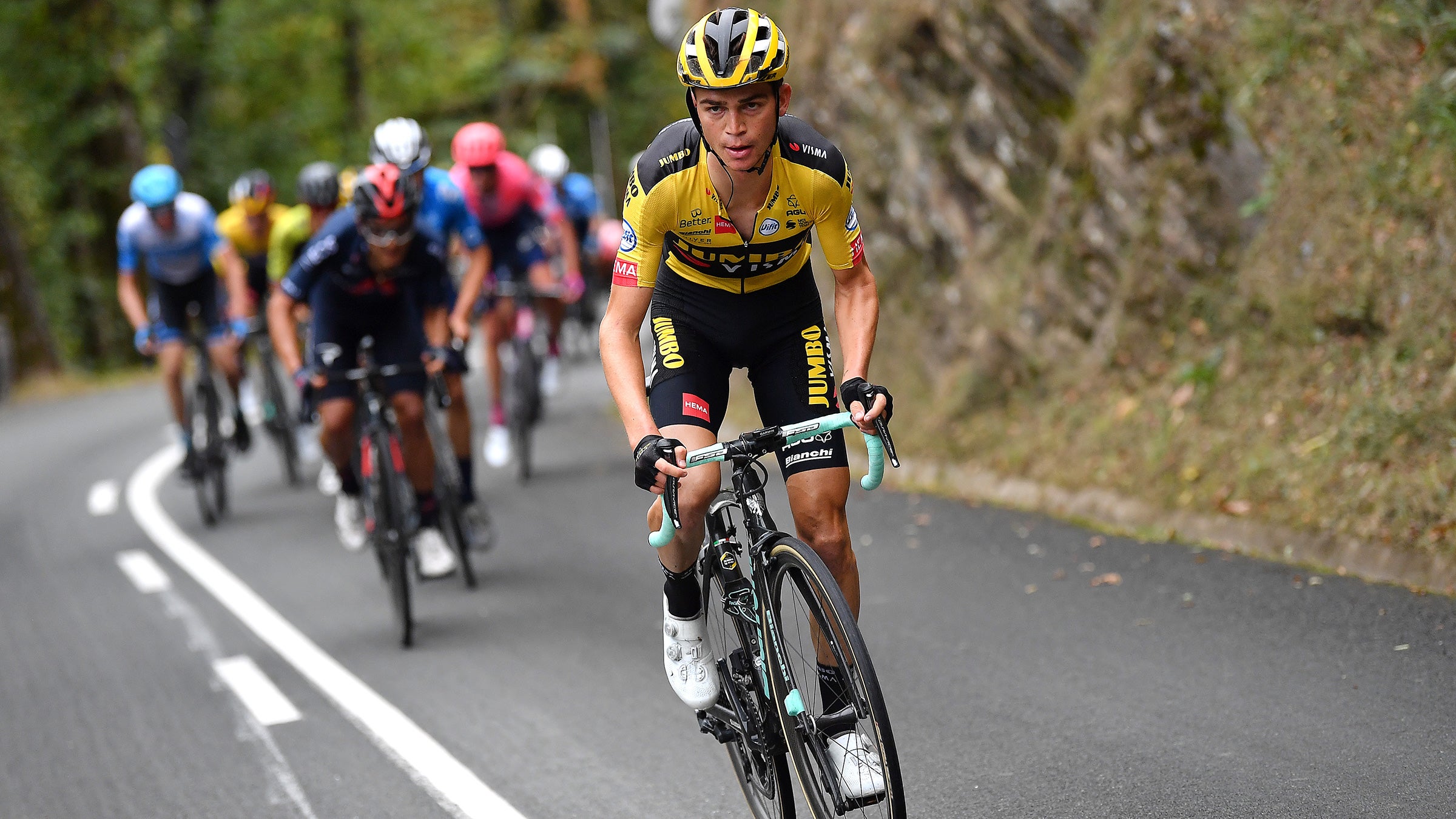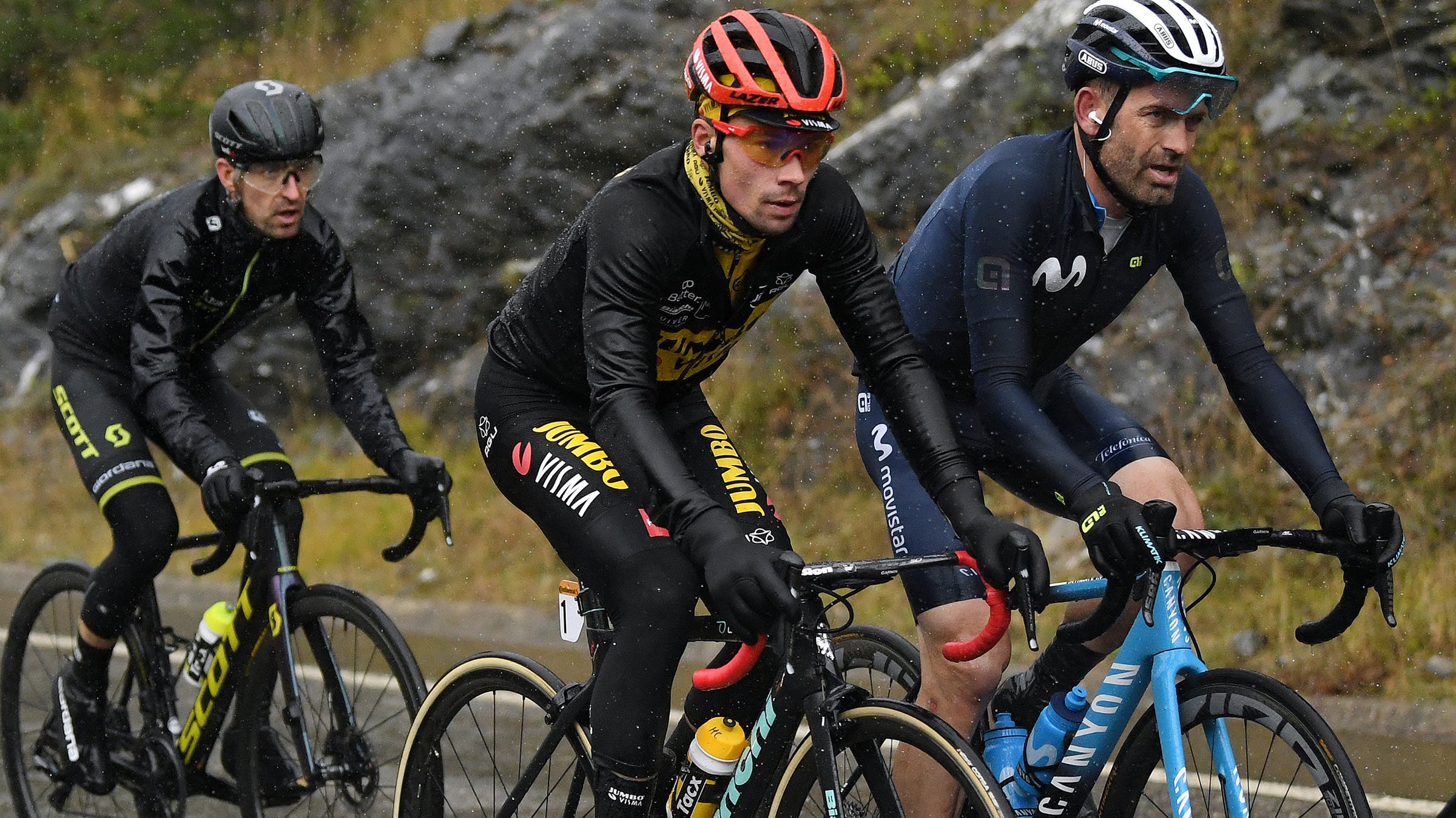Q&A: Sepp Kuss on Vuelta a España — ‘We want to win the race with Roglič’

(Photo: Justin Setterfield/Getty Images)
Sepp Kuss (Jumbo-Visma) was sipping tea and enjoying a bit of a respite in the warmth and tranquility of his hotel on Monday’s rest day at the Vuelta a España.
That was in sharp contrast to the extreme conditions and brutal racing in Sunday’s mountain stage to Formigal high in the cold and rainy Spanish Pyrénées. What was meant to cap a near-perfect week for Jumbo-Visma quickly unraveled on the descent of the day’s penultimate climb. Primož Roglič struggled to put on his rain cape just as Ineos Grenadiers and later Movistar were attacking over the top.
In what’s a reminder that a race can turn in an instant, and an even rarer mistake from the Dutch outfit, Roglič had to burn through several matches to regain contact before the final climb. The hard effort caused the Slovenian to cede the red leader’s jersey, but he was able to limit the losses and enters the second week still within striking distance of overall victory at 30 seconds back.
It was another story for Kuss. While teammate George Bennett helped Roglič to bridge across, Kuss was caught in no man’s land. Though he fought for as long as he could, he just missed regaining contact and ended up losing 10 minutes on the stage.
VeloNews spoke with Kuss on Monday’s rest day to get the inside details of what exactly happened. Here’s what he had to say:
VeloNews: Thanks for the call. Tell us what happened Sunday; Roglič lost the jersey, and you lost 10 minutes, hardly how the team would have liked it?
Sepp Kuss: It wasn’t a perfect day for us, by any means. It started off great, and it was a really strong breakaway, but we had everything under control. We knew that the descent before the final climb would be a bit nervous, we also knew that we had fresh rain jackets waiting for us near the top. It’s always hectic one K from the top, everyone is moving into position, and we had bags waiting for us with rain jackets. It was a bit of a mess. Primož, Robert [Gesink], and I were quite a bit behind, trying to wrestle with the rain jackets, and it was a bit too calm of a moment for what the situation was at the very front. I tried to stay with Primož, and at that point, I didn’t know what was going on at the front of the race. By the time we got to the bottom of the descent, the gap was something like 40 seconds. We had to do everything we could to close it on the flat, and had to bring back the front group. I just exploded trying to bridge that gap, and that was it for me. Luckily, Primož and George [Bennett] were up in the front group.
VN: Was it due to the wind that you couldn’t the jackets on, and suddenly Ineos and Movistar are pulling at the front?
SK: At least for myself, it was a situation I could have gone without one. I was thinking, we’ve got everything under control, it’s better to not freeze on the descent. It was cold enough that if you get too cold, your race is over as well. You have to take the risk. At the same time, in retrospect, we should have put on fresh rain jackets long before that point. We know it’s going to be a fight over the top of the climb, and once any other team sees Primož near the back, they’re going to drill it, of course. It was definitely a mistake to be sleeping at that moment.
VN: How were the roads on the descent? Ineos and Movistar both pulled to the front.
SK: It was a pretty wide road and it wasn’t that technical, but in the wet, and when the pace is super-high, then there are going to be gaps. At the time, I didn’t realize how far back we were in the peloton. We were quite far back, which is not acceptable to do when you have the race leader. We were really on the back foot.

VN: You described it as ‘exploding’ when you tried to chase back on, what happened?
SK: The other guys did a lot more than myself. I was trying to get up to them in the first place, and that was already a big effort. It was so explosive, and with the cold, I didn’t have anything in the tank. It wasn’t my best day either. Even if the circumstances were better, it would have been a day where I would have lost some time. I just really, really blew the engine on the bottom there. I tried for as long as I could to try to get into the cars in that group, but Movistar were riding flat out, so it was only a losing situation for myself. At least we had Primož and George up there.
VN: You started the stage in the top-10, but lost 10 minutes, what was going through your mind as you realized that?
SK: I wasn’t too stressed. We have Primož up there, and he is the strongest guy in the race. We want to win the Vuelta with Primož. The only disappointment was with myself losing time is that we lost a bit of a tactical piece. It’s always better to have more guys on GC, because that helps Primož a lot. It just wasn’t meant to be, we already have to move on. I think the same goal is still there.
VN: Did the team go over the stage in a post-race meeting?
SK: A little bit. It was not a good day. We were just too relaxed at a moment where it was a bit critical. We shouldn’t have been that far back. We should have ditched the rain jackets, and gone straight to the front. From the team side, maybe we should have organized something different, with getting jackets a bit earlier.
VN: It was a bit before your time, but that stage was similar to the famous ‘Froomigal’ episode during the 2016 Vuelta, was the team aware of that, and were you worried about a possible ambush?
SK: Yesterday it was mainly the conditions that played the decisive role. The stage with Froome, it was a bit of a different situation. It was on narrow roads, and it was blown up from kilometer-zero with a team attack. The stage yesterday, we were on big roads for most of the stage. It wasn’t something where there could be surprises in terms of the course. Everyone was expecting big differences considering how hard the conditions were, even if on paper, it doesn’t appear to be a super-hard day. The cold and rain make it really, really tough.
VN: Roglič is now 30 seconds off the lead, but the other climbers are saying they still need more time ahead of next week’s time trial; how do you see the GC unfolding now?
SK: Even with the time loss, it’s not huge. Under better circumstances, Primož is right with those guys, or even better. If we look at it in the context of yesterday, he had to ride 5 to 10 minutes of more or less of race-winning effort just to get up to the group. So he didn’t have anything left when he came down to it in the end. In the mountains, we can still be confident he can get some time back. And in the time trial as well, he can do some damage there. It’s a different situation now that we’re not in the red jersey, and that brings some different opportunities. We can rest our guys a bit more and play it a bit differently.
VN: How does this change your role? Do you see some opportunities for yourself next week for perhaps a stage win?
SK: We’ll see. The primary goal is to help Primož win. If I can be there with the favorites, we’ll see what kind of tactics we can play. At least in terms of control, now it’s up to the other teams to do the work.
VN: We’re seeing worsening conditions in Spain with COVID-19; how do you and the peloton feel about racing in these conditions? You also had controls on the rest day, right?
SK: We actually had our test before the start of Sunday. It feels very safe. There is hardly anybody outside of the ‘bubble’ that I have come in contact with. Even in the hotels, we can only sit four people at the table. It’s quite strict, and it feels very safe. The situation in Spain right now isn’t amazing, but as far as the race goes, it’s a good, safe atmosphere.
VN: Is there a sense of urgency that you need to get the leader’s jersey back as quickly as possible because the race could be canceled at any moment?
SK: Not too much. It’s out of our control anyway. From what we’ve heard, there’s no risk of that. It depends on what the government puts in place. It’s also strange to think to win a grand tour that only races for a week or a week and a half.